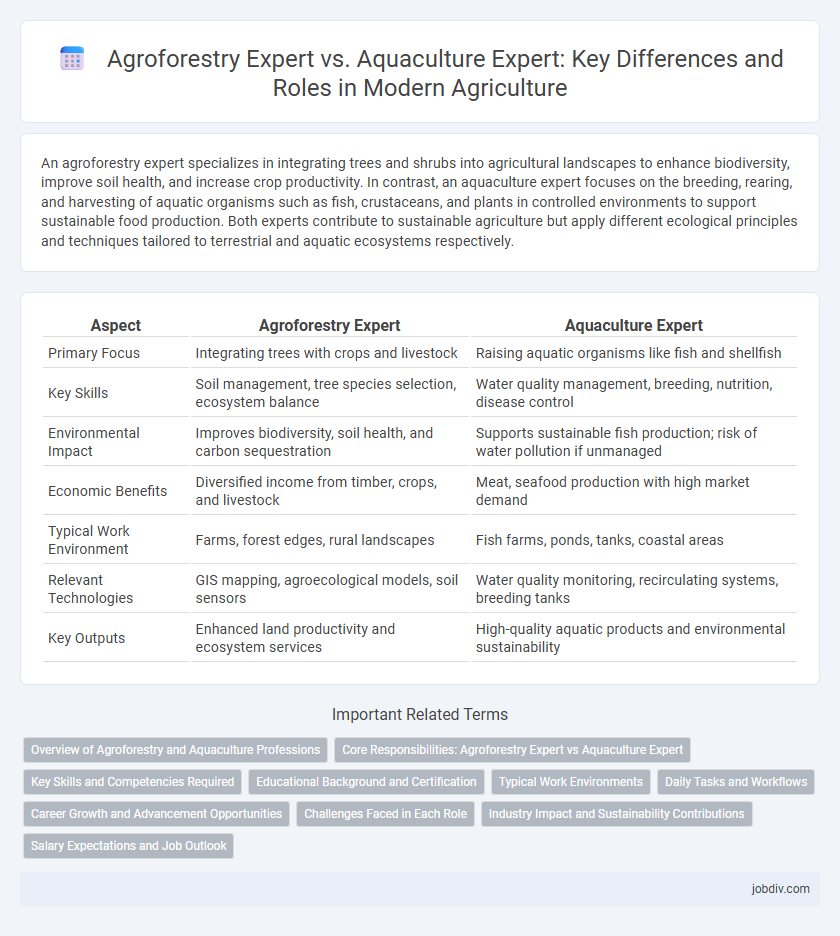An agroforestry expert specializes in integrating trees and shrubs into agricultural landscapes to enhance biodiversity, improve soil health, and increase crop productivity. In contrast, an aquaculture expert focuses on the breeding, rearing, and harvesting of aquatic organisms such as fish, crustaceans, and plants in controlled environments to support sustainable food production. Both experts contribute to sustainable agriculture but apply different ecological principles and techniques tailored to terrestrial and aquatic ecosystems respectively.
Table of Comparison
| Aspect | Agroforestry Expert | Aquaculture Expert |
|---|---|---|
| Primary Focus | Integrating trees with crops and livestock | Raising aquatic organisms like fish and shellfish |
| Key Skills | Soil management, tree species selection, ecosystem balance | Water quality management, breeding, nutrition, disease control |
| Environmental Impact | Improves biodiversity, soil health, and carbon sequestration | Supports sustainable fish production; risk of water pollution if unmanaged |
| Economic Benefits | Diversified income from timber, crops, and livestock | Meat, seafood production with high market demand |
| Typical Work Environment | Farms, forest edges, rural landscapes | Fish farms, ponds, tanks, coastal areas |
| Relevant Technologies | GIS mapping, agroecological models, soil sensors | Water quality monitoring, recirculating systems, breeding tanks |
| Key Outputs | Enhanced land productivity and ecosystem services | High-quality aquatic products and environmental sustainability |
Overview of Agroforestry and Aquaculture Professions
Agroforestry experts specialize in integrating trees and shrubs into agricultural landscapes to enhance biodiversity, improve soil health, and increase crop productivity, promoting sustainable land management practices. Aquaculture experts focus on the cultivation of aquatic organisms such as fish, shellfish, and algae, applying advanced techniques for breeding, feeding, and disease control to optimize production in controlled water environments. Both professions play crucial roles in sustainable food systems, with agroforestry emphasizing terrestrial ecosystem management and aquaculture centered on aquatic resource development.
Core Responsibilities: Agroforestry Expert vs Aquaculture Expert
An Agroforestry Expert specializes in integrating trees and shrubs into agricultural systems to enhance biodiversity, improve soil health, and increase farm productivity through sustainable land management practices. An Aquaculture Expert focuses on breeding, rearing, and harvesting aquatic organisms such as fish, shellfish, and algae, ensuring optimal water quality, disease control, and sustainable feed management within aquatic environments. Both experts require knowledge of ecosystem dynamics but apply it to distinctly different biological and environmental systems.
Key Skills and Competencies Required
An Agroforestry Expert requires proficiency in sustainable land management, knowledge of tree-crop-livestock systems, and expertise in ecological restoration techniques to enhance biodiversity and soil fertility. In contrast, an Aquaculture Expert must possess skills in fish biology, water quality management, and breeding techniques to optimize aquatic species production and ensure environmental sustainability. Both roles demand strong analytical abilities and familiarity with environmental regulations but differ significantly in their specialized knowledge and practical applications.
Educational Background and Certification
An Agroforestry Expert typically holds a degree in agriculture, forestry, environmental science, or natural resource management, often complemented by certifications in sustainable land management or agroforestry practices. An Aquaculture Expert usually possesses a background in marine biology, aquaculture, fisheries science, or environmental engineering, with specialized certifications such as aquaculture production or aquatic animal health management. Both professions require continuous education and industry-recognized credentials to stay updated on best practices and regulatory standards in their respective fields.
Typical Work Environments
Agroforestry experts typically work in mixed land-use areas where trees, crops, and livestock coexist, including farms, research stations, and community-based projects focused on sustainable land management. Aquaculture experts operate primarily in aquatic settings such as fish farms, hatcheries, and coastal or inland water bodies, overseeing the cultivation of fish, shellfish, and aquatic plants. Both professionals may collaborate with government agencies, environmental organizations, and agricultural firms to enhance productivity and ecological balance.
Daily Tasks and Workflows
Agroforestry experts focus on integrating trees and shrubs into agricultural landscapes, conducting soil health assessments, planning tree planting schedules, and monitoring crop-tree interactions to optimize land use and biodiversity. Aquaculture experts manage fish farming operations by overseeing water quality testing, feeding schedules, disease control, and breeding programs to maintain healthy aquatic populations. Both specialists utilize data analysis and field observations daily but apply distinct ecological principles tailored to terrestrial and aquatic ecosystems, respectively.
Career Growth and Advancement Opportunities
Agroforestry experts experience career growth by integrating sustainable land-use practices, enabling advancement in environmental consulting, policy development, and research positions that address climate resilience and biodiversity. Aquaculture experts advance through roles focused on sustainable fish farming technologies, aquatic ecosystem management, and biotechnology innovation, supporting global food security and environmental conservation. Both fields offer expanding opportunities driven by increasing demand for sustainable agriculture and seafood production, with specialization pathways enhancing expertise and leadership potential.
Challenges Faced in Each Role
Agroforestry experts confront challenges such as balancing crop and tree growth to optimize land use while preventing soil degradation and managing pest interactions within diverse ecosystems. Aquaculture experts face difficulties in maintaining water quality, controlling disease outbreaks in dense aquatic populations, and ensuring sustainable feed practices to minimize environmental impact. Both roles demand expertise in ecosystem management but differ sharply in the environmental variables and species-specific health issues they address.
Industry Impact and Sustainability Contributions
Agroforestry experts enhance industry sustainability by integrating tree cultivation with crops and livestock, improving soil health, biodiversity, and carbon sequestration. Aquaculture experts drive sustainable seafood production through advanced breeding, water quality management, and disease control, reducing pressure on wild fish stocks. Both roles are critical for promoting environmental resilience and economic viability in their respective sectors.
Salary Expectations and Job Outlook
Agroforestry experts typically earn a median salary ranging from $55,000 to $75,000 annually, with job growth projected at 7% due to increasing demand for sustainable land management. Aquaculture experts, benefiting from the expanding global seafood market, have a slightly higher median salary between $60,000 and $80,000 and a robust job outlook with growth rates near 10%. Both fields emphasize environmental sustainability, but aquaculture offers more rapid employment opportunities driven by rising food security concerns.
Agroforestry Expert vs Aquaculture Expert Infographic

 jobdiv.com
jobdiv.com